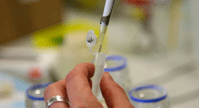Pyruvate Kinase Deficiency (PKD)
Description:
Pyruvate Kinase Deficiency is a disorder that affects red blood cells. Dogs suffering from Pyruvate Kinase Deficiency have a mutated form of pyruvate kinase, an important enzyme in cellular metabolism. This defect causes the red blood cells to die, leading to severe hemolytic anemia. Because red blood cells deliver oxygen to tissues around the body, it is important that dogs are able to maintain an adequate supply of red blood cells. Dogs suffering from PK deficiency typically are chronically anemic.
Symptoms of PKD usually begin to show between four months to one year. The symptoms can include weakness, lack of energy, rapid heart rate, heart murmurs, pale gums, and stunted growth. As the disease progresses, bones and the liver can be affected. The disease is ultimately fatal. Dogs with PKD commonly die before 4 years of age. However, longevity is affected by the breed of dog, with some breeds able to survive longer than others. While there is currently no cure for PKD, it is possible for affected dogs to have a reasonable quality of life with palliative care.
Pyruvate Kinase Deficiency (PKD) is an autosomal recessive trait which means both parents of an affected (homozygous) dog must be carriers (heterozygous) for the disorder. Heterozygous dogs are usually asymptomatic, and it may be difficult to detect clinical signs of the condition in inactive homozygous dogs. It is therefore useful to test for the presence of the mutation before breeding. Breeding without testing could lead to a chance that individuals in the litter will be homozygous for PKD and present symptoms.
Canine PKD was originally documented in Basenjis; it has since been reported in other breeds, including Dachshunds, Labrador Retrievers, Pugs, Beagles, Cairn Terrier and West Highland White Terriers.
Acceptable Sample Types:
Animal Genetics accepts buccal swab, blood, and dewclaw samples for testing. Complimentary sample collection kits are available and can be ordered at test now.
This Test Is Relevant For the Following Breeds:
Beagle, Labrador Retriever, Pug.
Results:
Animal Genetics offers DNA testing for Pyruvate Kinase Deficiency (PKD). The genetic test verifies the presence of the recessive variant in PK-LR gene and presents results as one of the following:
| PKD/PKD | Affected | The dog carries two copies of the variant in PK-LR gene and is homozygous for PKD. The dog is affected and will always pass a copy of the mutated gene to its offspring. |
| PKD/n | Carrier | Both the normal and variant in PK-LR gene. Dog is a carrier for PKD and can pass on a copy of the defective gene to its offspring. |
| n/n | Clear | Dog tested negative for the variant in PK-LR gene and will not pass on the defective gene to its offspring. |
References:
Gultekin GI, Raj K, Foureman P, Lehman S, Manhart K, Abdulmalik O, Giger U. Erythrocytic pyruvate kinase mutations causing hemolytic anemia, osteosclerosis, and seconday hemochromatosis in dogs. J Vet Intern Med. 2012 Jul-Aug;26(4):935-44.
Submit a Sample for Testing:
To submit a sample for testing please go to test now.
To
order a sample collection kit please go to order sample collection kits.
Cost per sample is $45.00. Please see our Canine Fee Schedule for all test rates.










